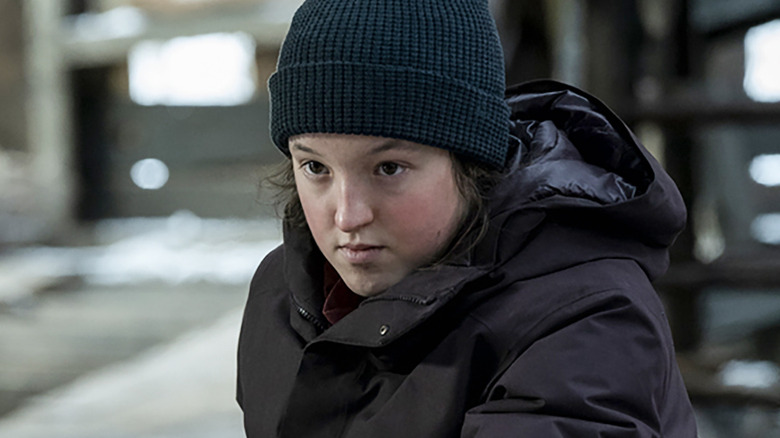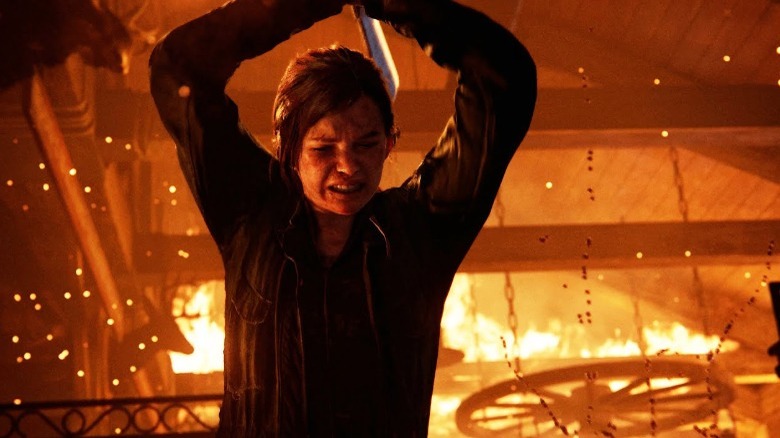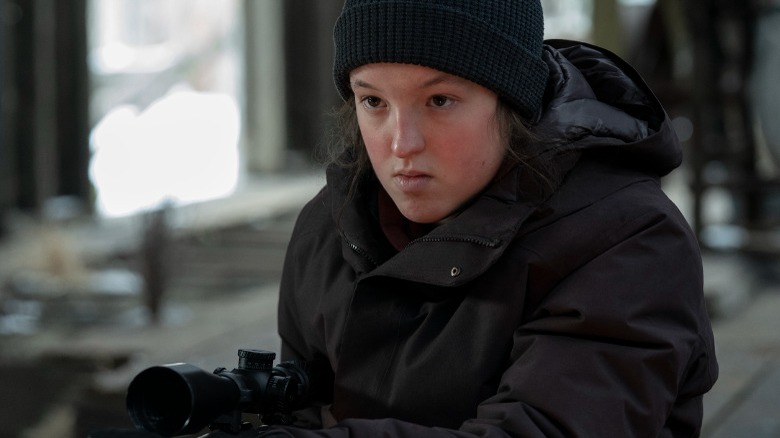HBO's The Last Of Us Brought Back A Classic Visual From The Video Game
This post contains spoilers for HBO's "The Last of Us" and the video game series of the same name.
In the latest installment of HBO's "The Last of Us," titled " When We Are in Need," the status quo between Joel (Pedro Pascal) and Ellie (Bella Ramsey) shifts significantly. No longer able to perform the role of protector after being grievously injured, Joel finds himself dependent on Ellie for survival during an especially harsh winter, while Ellie is forced to actively scrounge for resources to keep both of them alive. Things take a darker turn when she crosses paths with David (Scott Shepherd) and James (Troy Baker), who are a part of the same group that attacked the duo at the university. Vengeance and trauma define what happens next, as Ellie is forced to reckon with her kill-or-be-killed instincts. David, a misogynistic cannibal who preys on Ellie in heinous ways, emerges as more monstrous than any bloater or clicker — he represents such a twisted brand of evil that Ellie has to take matters into her own hands and finish him off herself.
This particular moment is a rather traumatic highlight in the "Last of Us" video game, where the events leading up to David's death unravel in a similar fashion, barring a few minute differences. After successfully managing to evade David and wounding him several times, the player triggers a cutscene, in which David proceeds to choke Ellie, which prompts her to grab a machete and hack him repeatedly.
The power of this scene is heightened by the choice to linger the camera on Ellie, who is covered in blood splatters that also land on the camera. This blood-on-the-camera visual from the games is replicated in the show, and the implications remain as, if not more, heartbreaking and devastating.
A brutal turning point
Just like in the games, Ellie is extremely wary of David when he proposes a barter, but she accepts this offer to retrieve antibiotics for Joel. After all, Ellie is not naive, as she understands that humans are more dangerous than the infected, given that they are capable of duplicity and heinous acts in the name of survival. David's group is no different: Although the show hints that not everyone in the group is aware of the cannibalism aspect, these people hardly have any other choice but to actively endorse or passively suffer David's abusive behavior. Hypocrisy grips humanity even in a world that's ending, as David's group deems Joel a monster for defending Ellie at the university, but fail to acknowledge (or deliberately evade) their own evil.
While David's men are adamant to kill Ellie, David obsessively insists that she be allowed to live, as she can be recruited into their group. This, obviously, is not an act of compassion but a part of his twisted power play, as David views her as an object to further legitimize his illusion of righteousness. After Ellie retaliates, he initially intends to kill and eat her, but then proceeds to indulge in a sick cat-and-mouse game and attempts to sexually assault her. As David's cannibalistic and paedophilic urges are mapped out much more explicitly in the show, this heightens the impact of the moment when Ellie hacks into him repeatedly, drenched in his blood, with the room aflame around her.
Just like in the games, the focus is not on David, but on Ellie's rage, trauma, and the cathartic retribution that comes along with this act of self-defense. The blood on the lens is a grim reminder that this incident will leave a mark on Ellie forever.
Carrying the weight of trauma
Even before encountering Joel, Ellie has had to contend with unimaginable pain and loss. Essentially on her own for most of her life, Ellie finds a sense of home in Joel, who is now ready to go to any lengths to protect her. While a wounded Joel brutally hunts and kills members of David's group to find Ellie, she is forced to look evil straight in the eye with no one to protect her from harm. The realization that David's group eats people and that he has a twisted interest in her is enough to scar Ellie, but when she is hunted by him inside the chapel and mocked for her resilience, something inside her snaps. This is a turning point for Ellie, who goes from a wide-eyed child brimming with hope to a hardened, traumatized young adult who has had enough of the horrors that the world has to offer.
When Joel finally arrives on the scene and attempts to comfort her, she is still in flight-or-fight mode, and understandably so. It is only when Joel calls her "baby girl" — an overt affirmation that she is now family to him — that Ellie eases into his arms and weeps in relief. She is safe now, reunited with the only person she can trust with her life. While Ellie has experienced trauma before, with Riley's demise and the deaths of Henry, Sam, and Tess, this incident alters her worldview for good.
Unfortunately, Ellie will never be able to drop her guard easily in front of other survivors (like she did with Henry and Sam), as people like David serve as a harsh reminder and a terrifying wake-up call that evil lurks in every corner of the world — even one wrapped in a civilization-killing fungus.


